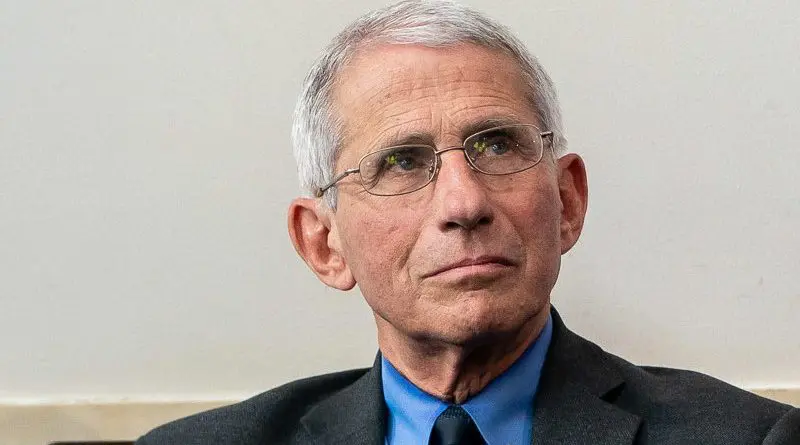Fauci Family Values – OpEd
Dr. Anthony Fauci, formerly Joe Biden’s top medical advisor, has accepted a position as a distinguished professor at Georgetown University Medical School. As NBC news explains, Dr. Fauci has “several personal connections” to the campus.
Dr. Fauci’s wife Christine Grady earned her undergraduate and PhD degrees at Georgetown. Fauci and Grady were married in Georgetown’s Dahlgren Chapel, and their three daughters were born at Georgetown Hospital. The NBC report fails to note that Grady is the head of bioethics at the National Institutes of Health (NIH), and that her personal connections with Dr. Fauci are far more extensive.
In 1995, Christine Grady authored The Search for an AIDS Vaccine: Ethical Issues in the Development and Testing of a Preventative HIV Vaccine, published by Indiana University Press. On page 55, readers meet Dr. Anthony Fauci, the “director of NIAID,” the National Institute of Allergy and Infectious Diseases, and “the branch of the NIH primarily responsible for vaccine development.”
Christine Grady, then an NIH nurse, does not tell readers that she had been married to Dr. Fauci for ten years. Her handling of ethical issues will be of great interest to parents across the nation. For example, on page 72:
Protection of the rights, interests, and well-being of the individual as the main consideration in ethical guidance concerning the conduct of clinical research has been criticized by international scientists, representatives of developing countries, epidemiologists, and others. Some have argued stridently for a better balance between individual interests and societies’ interests. Some critics have claimed that the research codes’ emphasis on individualism and protection of individual rights (based on a Western political liberal philosophy) is incompatible with less individualistic cultural and moral perspectives in which persons define themselves in relation to their community, and in which conflict between the interests of the individual and the community would be hard to imagine.
On page 73, Grady cites an epidemiologist who contends:
A person-dominated medical ethic that focuses primarily on individual rights and duties and does not see individuals as part of a wider social order and community is insufficient for the task of setting moral and human rights boundaries around the conduct of research populations.
The author, who earned her PhD in philosophy, is all-in.
“The primary participant and beneficiary of vaccine research is the community,” concludes Grady, who recommends research “in which the client and principal beneficiary is the community.” The “community” and “society” is a distinction without a difference, but Grady’s casuistry proved no bar to advancement.
In 2012, the NIH named Christine Grady chief of the Department of Bioethics of the NIH Health Clinical Center. Grady came billed as “a strong international voice in human subjects protections,” but no word that she had been married to Dr. Fauci for nearly 30 years, and nothing on the conflict of interest in the new arrangement. As with his wife Christine, “individualism and protection of individual rights” have little meaning for the NIAID boss.
“There comes a time when you do have to give up what you consider your individual right of making your own decision, for the greater good of society,” contended Dr. Fauci in October of 2021.
Children are low risk for COVID-19 but Dr. Fauci wanted to vaccinate them, starting in the first grade. According to his wife, the rules for vaccine development are the same as for drug trials. Dr. Fauci’s drug of choice for AIDS was AZT (azidothymidine), marketed as Zidovudine and Retrovir.
In 1992, Dr. Fauci’s NIAID forced New York City foster children, most of them African American, to take AZT and other highly toxic drugs. As mathematical biologist Rebecca V. Culshaw explains in The Real AIDS Epidemic: How the Tragic HIV Mistake Threatens Us All, “several children died, not of AIDS but of strokes due to the toxic nature of these drugs.”
In similar style, the rush to approve allegedly “lifesaving” mRNA vaccines for COVID “was essentially a massive clinical trial conducted in real time on the entire population.” For some of the results, see “A review of neurological side effects of COVID-19 vaccination,” and this study on “serious adverse events of special interest.”
Anthony Fauci earned a medical degree in 1966 but in 1968 he took a job with the National Institutes of Health. Dr. Fauci’s bio showed no advanced degrees in molecular biology or biochemistry, but in 1984 the NIH made Dr. Fauci director of NIAID.
Nobel laureate Kary Mullis, inventor of the polymerase chain reaction (PCR), is on record that Dr. Fauci “doesn’t understand electron microscopy and he doesn’t understand medicine. He should not be in a position like he’s in.” Dr. Fauci, who claims “I represent science,” remained at the helm for nearly 40 years, with little if any accountability to the people.
To prevent this concentration of power, Congress should never again allow a single person to control public health policy and spending on medical research. Scale back NIAID and limit the director to a single four-year term. Post all grants in real time and downloadable form.
Above all, the NIAID director should not be related to anyone in the NIH hierarchy, particularly the chief of bioethics. White coat supremacy has no place in our democracy.
This article was also published in The American Spectator

